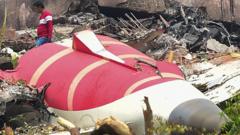The AAIB is expected to assess all relevant technical, safety, and security issues before making a decision on the location for analysis. The Enhanced Airborne Flight Recorders (EAFRs), recovered from the crash site, document critical flight parameters, which can aid in reconstructing the events leading to the incident. However, preliminary assessments indicate that the recorders may have suffered significant fire damage, posing challenges for data extraction in India.
Captain Kishore Chinta, a former investigator with the AAIB, speculated that one of the recorders may be sent to the US for comparative data analysis with the National Transportation Safety Board. The new AAIB laboratory in Delhi, opened in April, may not yet be fully operational for this type of data processing.
In a separate development, Air India has stated that while one engine of the ill-fated aircraft was newly fitted, the other was not due for service until December. Following the crash, India's aviation regulatory authority mandated extra safety examinations of Air India’s fleet. Consequently, the airline announced a reduction of flights on 16 international routes and a temporary suspension of operations to three destinations in response to enhanced pre-flight safety measures.
This ongoing investigation underscores the urgent need for thorough analysis as the airline navigates the ramifications of this tragic incident.
Captain Kishore Chinta, a former investigator with the AAIB, speculated that one of the recorders may be sent to the US for comparative data analysis with the National Transportation Safety Board. The new AAIB laboratory in Delhi, opened in April, may not yet be fully operational for this type of data processing.
In a separate development, Air India has stated that while one engine of the ill-fated aircraft was newly fitted, the other was not due for service until December. Following the crash, India's aviation regulatory authority mandated extra safety examinations of Air India’s fleet. Consequently, the airline announced a reduction of flights on 16 international routes and a temporary suspension of operations to three destinations in response to enhanced pre-flight safety measures.
This ongoing investigation underscores the urgent need for thorough analysis as the airline navigates the ramifications of this tragic incident.

















